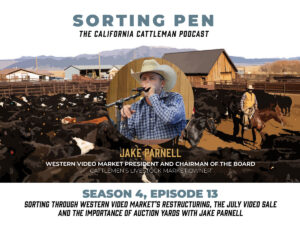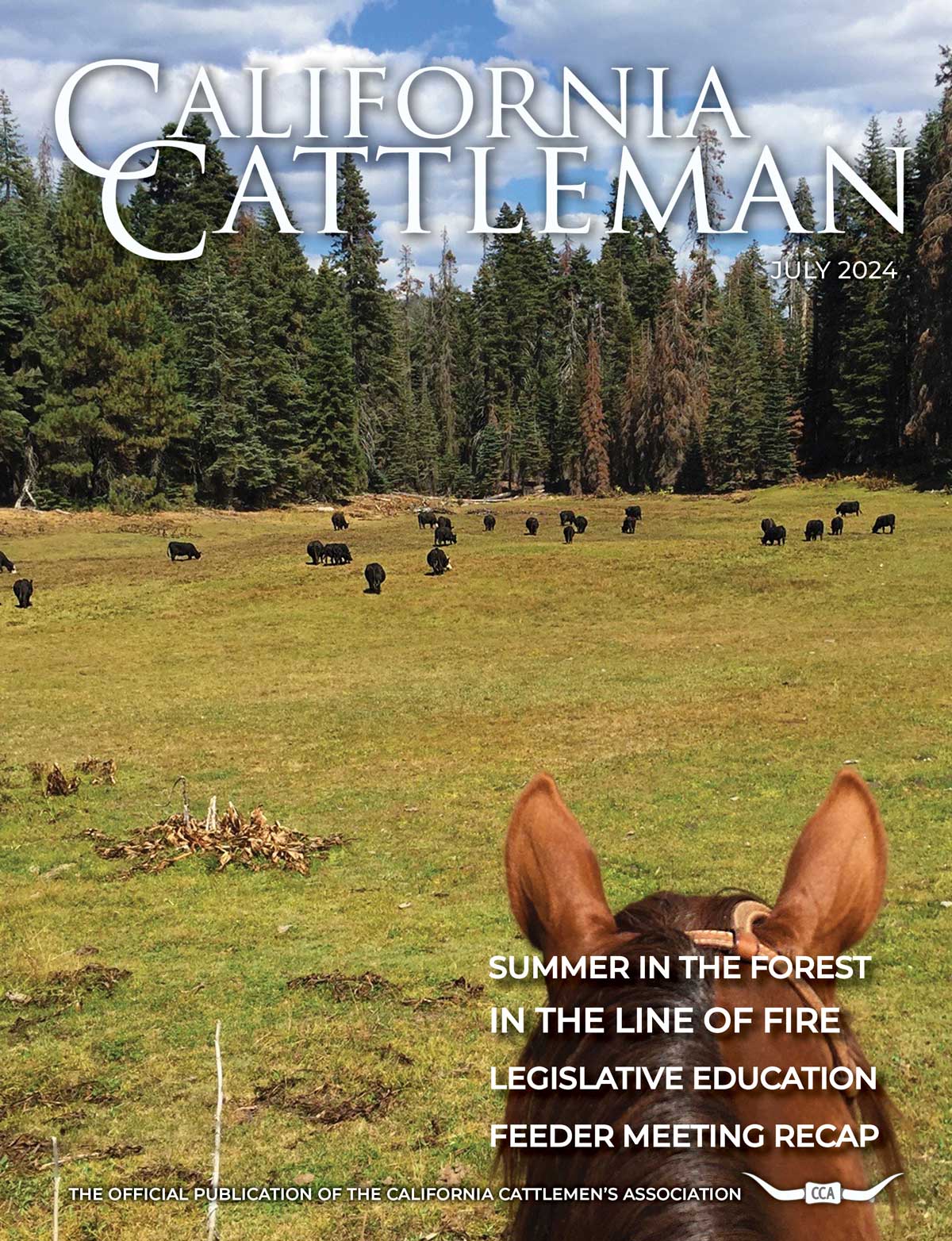
CALIFORNIA CATTLEMAN WEEKLY
July 1, 2024
To read the full version each week, please subscribe below.
It’s Official: CCA Secures Funding for Wolf Compensation in Revised Budget
Today marks the beginning of the state’s 2024-25 Fiscal Year. Just ahead of the new Fiscal Year, on Saturday, Governor Gavin Newsom announced that he had signed Senate Bill 108, the “Budget Bill Junior” reflecting the final Budget negotiated between the Governor’s Administration and both chambers of the State Legislature.
Tucked away in the revised Budget is CCA’s top Budget priority of the year: renewed funding for the California Department of Fish and Wildlife’s Wolf-Livestock Compensation Program. Specifically, section 102 of the Act earmarks $600,000 from CDFW’s Biodiversity Conservation Program for wolf compensation.
In addition to funding for the Program in the revised budget, the pending public resources budget trailer bill also includes new statutory language authorizing CDFW to “allocate federal funds and any moneys received as donations for purposes of the Wolf-Livestock Compensation Pilot Program.”
For more information about renewed funding for the Wolf-Livestock Compensation Program, see last week’s edition of California Cattleman Weekly. A full analysis of Budget highlights impacting cattlemen will be provided in the August edition of the California Cattleman magazine.
CCA Thwarts Effort to Prop Up “Alternative Protein” in Climate Bond
Legislators yesterday released the long-anticipated language of a proposed climate bond to be put before voters on the November 5 General Election ballot. The Safe Drinking Water, Wildfire Prevention, Drought Preparedness, and Clean Air Bond Act of 2024 would authorize $10 billion in general obligation bonds to finance projects for drought, flood, and water resilience; wildfire and forest resilience; biodiversity and nature-based climate solutions; and climate-smart, sustainable, and resilient farms, ranches, and working lands, among other priorities.
Negotiations over the proposed climate bond came down to the wire, with lawmakers waving a statutory deadline of June 27 to continue last-minute negotiations over the bond’s contents. With a deadline of July 3 to get bond details included in the information guide sent to California voters and a Constitutional requirement for the Legislature to have bills in print for 72 hours before taking votes, yesterday was the absolute latest that legislators could unveil their proposal.
As negotiations progressed last week, CCA learned that a group of legislators – led by Sen. Josh Newman (D-Fullerton) – were aggressively pushing to include within the bond $50 million “for UC Davis to construct a shared, pilot-scale facility for alternative protein development.”
The alternative protein proposal was initially released in February, and CCA aggressively lobbied against the proposal at that time. Proponents of ‘alternative proteins’ willfully misstate the environmental impacts of beef production, overlook environmental benefits of ranching (such as carbon sequestration and wildfire resilience) and rely on unsubstantiated claims to advance alleged climate benefits of meat alternatives. Additionally, alternative protein promotion primarily stands to benefit venture capitalists who have invested in those products; it is those private investors, not the people of California, who sure bear the costs of researching and developing those products.
As lawmakers negotiated climate bond language last week, CCA was in constant contact with key negotiators to oppose funding for alternative proteins, educating lawmakers on the benefits of cattle ranching and beef consumption and informing them about the unsubstantiated claims of alternative protein advocates.
CCA is proud to report that those efforts paid off, and funding for alternative protein research and development does not appear in the climate bond language released yesterday.
For additional insights into climate bond provisions of interest to cattle producers, see the August edition of the California Cattleman magazine.
Supreme Court Overturns Doctrine of Chevron Deference
On Friday, the U.S. Supreme Court issued its hotly anticipated ruling in Loper Bright Enterprises v. Raimondo, overturning a decades-old legal doctrine known as Chevron deference which dictated that courts acquiesce to federal regulatory agencies’ interpretations of vague statutes. As explained in Chief Justice John Roberts’ majority opinion in Loper, the Court’s Chevron precedent, handed down in 1984, “sometimes required courts to defer to ‘permissible’ agency interpretations of the statutes those agencies administer— even when a reviewing court reads the statute differently.”
On Friday, the Supreme Court explicitly overruled Chevron, holding that “Courts must exercise their independent judgment in deciding whether an agency has acted within its statutory authority” rather than deferring to an agency’s interpretation of that statute.
The decision was immediately celebrated by CCA’s national partner, the National Cattlemen’s Beef Association. “In the last four decades, Congress has ceded authority to unelected federal bureaucrats who make the regulations that impact farmers and ranchers every day,” said NCBA Chief Counsel Mary-Thomas Hart. “Long-term, this decision will impact almost every regulation that NCBA has worked on. The decision puts Congress back in the driver’s seat for crafting policy, reins in the administrative state, and strengthens accountability by ensuring that the people we elect are the ones crafting our nation’s laws.”
Loper’s impact on a wide array of federal regulations will not be immediately felt, but the decision does open various regulations previously upheld under the Chevron deference principle to new legal challenges and will circumscribe agencies’ implementation of new federal laws.
It is unclear how significantly Loper’s impact will be felt in California. The decision only applies to federal regulations and is unlikely to provide sufficient basis to challenge California regulations independently authorized under state law. Moreover, it is a certainty that California lawmakers will work feverishly to shore up the state’s regulatory authority in the wake of Loper and in the face of likely forthcoming cases seeking to weaken federal regulations.
CCA will continue to lobby in Sacramento and Washington, D.C. for a favorable regulatory environment for California’s cattle ranchers and will keep members informed of the federal regulatory impacts of the Court’s Loper decision.
Save your Spot for a Virtual Social Media Training for Ranchers
Join the California Cattlemen’s Foundation for a virtual social media training on July 17 at 7pm. Whether you want to know how to take better images and videos for your personal or business social media pages or learn how to contribute to our content, join us for this one-hour training.
The training will include a panel and Q&A with a few California cattle producers who actively share posts about their cattle operation and ranching in California. The panel of producers will be announced soon!
Expect to hear from these producers on:
- How they got started sharing about ranching and cattle production on social media
- Why they it is valuable to share about ranching in California on social media
- Advice for getting started and generating ideas for creating content
- Lessons learned
This is a free training hosted by the California Cattlemen’s Foundation with support from the California Cattle Council. RSVP at calcattlemenfoundation.org/webinars.
Reminder: Curtailments in Effect for Shasta River Watershed
The State Water Resources Control Board (SWRCB) has issued a curtailment order for the Shasta River Watershed requiring all diversion under water rights with a priority date of January 1, 1958 or later to cease immediately. The curtailments are authorized under Order WR 2024-0006-DWR.
Water rights within the Shasta River Watershed with priority dates between November 25, 1912 and December 31, 1957 remain conditionally curtailed, meaning that diverters must coordinate with the Scott Valley and Shasta Valley Watermaster District or the SWRCB to ensure that diversion timing and rates are sufficient to sustain the minimum emergency flow requirement of 50 cubic feet per second as measured at the U.S. Geological Survey Yreka gage. If minimum flows are not sustained via coordination, diversions must cease in order of water right priority.
For additional information, see last week’s edition of California Cattleman Weekly or visit the SWRCB’s “Scott River and Shasta River Watersheds Emergency Regulation” webpage.
Upcoming CCA Events
108th CCA & CCW Annual Convention & California Cattle Industry Tradeshow
Dec. 4 – 6, 2024, Grand Sierra Resort, Reno, Nev.
The 108th CCA and CCW Annual Convention and California Cattle Industry Tradeshow will take place Dec. 4 – 6, 2024 at the Grand Sierra Resort in Reno, Nev. More information will be made available as the event approaches.
Upcoming Industry Events
Registration Open for 2024 NCBA Summer Business Meeting
July 8-10, Hilton San Diego Bayfront Hotel, San Diego, CA
Registration for the NCBA Summer Business Meeting happening July 8-10, 2024 at the Hilton San Diego Bayfront Hotel in San Diego. To register, click here. To view the agenda click here.
Public Lands Council Annual Meeting
Sept. 17-19, DoubleTree by Hilton, Grand Junction, Colo.
Registration is now open for the Public Lands Council’s 56th Annual Meeting, to be held in Grand Junction, Colorado from September 17-19. Registration for the three-day in-person event is $375, with discounted rates available for family members, students and media. The entire event will be hosted in the DoubleTree Hilton. For additional details and to register, click here.
CCA in the News
Wolf Compensation Program Receives Renewed Funding AGInfo.net “A big announcement out this week in that the California Department of Fish and Wildlife has announced renewed funding for the Wolf-Livestock Compensation Program. Governor Newsom confirmed the agreement on June 22, with the revised State Budget allocating $600,000 for the program. Although this amount is less than requested, it’s a significant victory according to the California Cattlemen’s Association, allowing the CDFW to continue compensating ranchers for livestock losses due to wolves.” To continue reading, click here.
CCA Secures Funding for Wolf Compensation in Revised Budget Morning Ag Clips “‘Funding for the Wolf-Livestock Compensation Program has been CCA’s hardest-fought battle this year, and I’m elated to see renewed funding for the Program nearly across the finish line,’ CCA Vice President of Government Affairs Kirk Wilbur said.” To continue reading, click here.
Industry News
‘Rainbow Family’ members ordered to leave California forest or face fines or jail time Los Angeles Times “The U.S. Forest Service ordered hundreds of people gathered for a ‘Rainbow Family’ celebration at an unsanctioned camp to vacate Plumas National Forest within 48 hours or face fines or jail time.” To continue reading, click here.
California National Forests Complete Record Number of Prescribed Fire Acres Ledger Dispatch “As of 10 a.m. today, the USDA Forest Service has treated 63,878 acres with prescribed fire on national forests across the state. The previous record was set in 2018 when 63,711 acres were treated.” To continue reading, click here.
USDA Proposes New Rule Under Packers & Stockyards Act to Clarify ‘Unfair Practices’ Brownfield Ag News “Ethan Lane, vice president of government affairs with the National Cattlemen’s Beef Association says it is a direct attack on producer profitability and creates criteria that would deem any innovation or differentiation in the marketplace improper. Lane says those practices are central to how cattle producers around the country differentiate their products in the marketplace, derive premiums, and attempt to be profitable. ‘USDA is attempting yet again to undermine that,’ he says. ‘To get everybody back to some point where they are all receiving the same price for their cattle, regardless of quality in some sort of a misguided attempt to achieve fairness in the marketplace is disappointing, but not unexpected.’” To continue reading, click here.
A new episode of Sorting Pen: The California Cattleman Podcast is out now! In this week’s episode, Jake Parnell makes his debut on Sorting Pen to discuss Western Video Market’s recent restructuring, give an outlook on the July WVM sale and discuss the importance of auction yards. To listen, click here.



